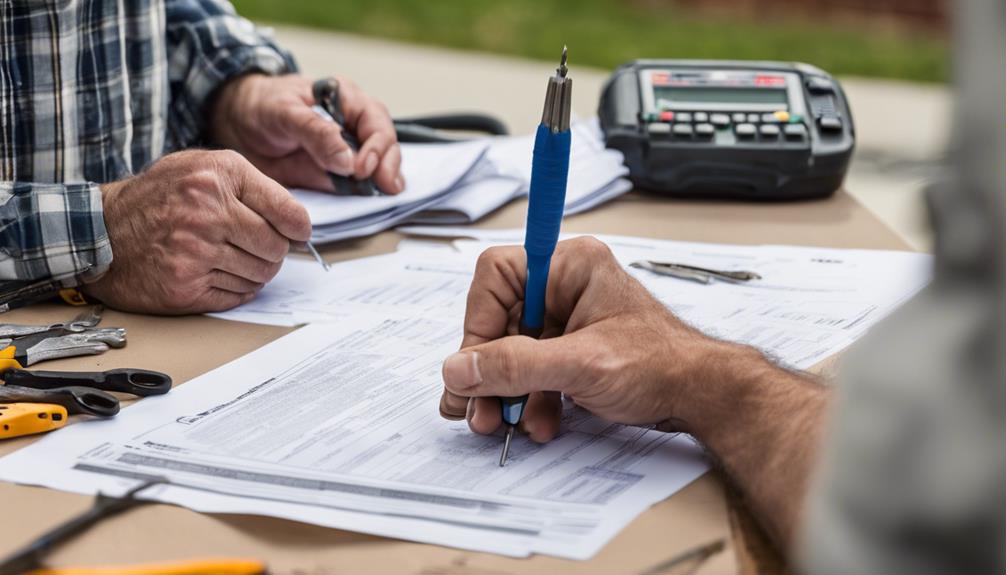If you're operating as an electrical contractor in Prince William County, VA, you've likely encountered the necessity of securing an electrical contractor bond. This $10,000 surety bond isn't just a regulatory hurdle; it plays a crucial role in protecting both you and your clients from potential issues like malpractice or incomplete work. Understanding the bond requirements and the application process can seem daunting, but grasping these essentials can significantly enhance your professional standing. What are the real benefits of having this bond, and how can it influence your future projects?
Importance of Electrical Contractor Bonds

When it comes to hiring an electrical contractor, understanding the importance of electrical contractor bonds can save you from potential headaches. These bonds act as a safety net, ensuring that contractors adhere to local regulations and complete their work according to industry standards.
In many regions, including Michigan, surety bonds are essential for compliance and are tailored to meet specific project requirements, such as Michigan Surety Bonds. When you work with a bonded contractor, you're not just hiring someone to get the job done; you're also securing a level of accountability.
If a contractor fails to meet their obligations, the bond provides financial protection, allowing you to file a claim for any damages or incomplete work. This means you won't be left footing the bill for shoddy workmanship or unfulfilled contracts.
Additionally, hiring a bonded contractor gives you peace of mind, knowing that they've gone through the necessary vetting process and are committed to maintaining a good reputation.
It's essential to verify that your chosen contractor holds an up-to-date bond. This simple step can prevent disputes and ensure that your electrical project proceeds smoothly.
Bond Requirements in Prince William County
To ensure compliance and protect both contractors and clients, Prince William County has specific bond requirements for electrical contractors. As an electrical contractor, you need to secure a surety bond to operate legally in the county. This bond acts as a guarantee that you'll adhere to local regulations and complete your work to the agreed standards, serving as a form of financial protection for the public against potential malpractice.
Typically, you'll be required to obtain a bond in the amount of $10,000. This amount is set to cover any potential damages or claims resulting from your work. It's crucial to remember that the bond must be issued by a licensed surety company approved by the Commonwealth of Virginia.
Before starting any project, you should also check if additional requirements apply based on the scope of your work. Failing to meet these bond requirements can lead to penalties, including the suspension of your contractor license. Therefore, it's essential to understand these obligations thoroughly.
Ensuring that your bond is current and meets the county's standards can help maintain your reputation and secure client trust. Always double-check the latest regulations to stay compliant and protect your business effectively.
Application Process for Bonds

Securing a surety bond involves a straightforward application process that you need to follow closely.
First, you'll want to gather all necessary documentation, which typically includes your business license, financial statements, and any previous bond information. Having these documents ready will streamline your application and make the approval process smoother.
Additionally, it's beneficial to understand the various bond types available to ensure you're applying for the correct one.
Next, choose a reliable surety bond provider. You can research various companies, read reviews, and even ask for recommendations from colleagues in the electrical contracting field.
Once you've selected a provider, fill out their application form. This form usually requires personal information, business details, and financial history.
After submitting your application, the surety company will conduct a thorough review. This may involve background checks and assessments of your creditworthiness and financial stability.
Be prepared to answer any follow-up questions they may have.
Benefits of Having a Bond
Having a bond in place offers you several significant advantages that can enhance your credibility and business prospects. First and foremost, it demonstrates your commitment to quality and compliance. Clients are more likely to trust a contractor who's bonded, knowing there's financial protection in case of any issues.
Additionally, having a bond can help you stand out from your competitors. Many clients prioritize working with bonded contractors, which means you can attract more business. It also opens the door to larger projects that might require bonding, expanding your potential client base.
Moreover, bonds can provide a safety net for your business. In the event of a claim, the bond ensures that funds are available to cover any losses, protecting both you and your clients. This level of financial security can give you peace of mind while working on projects.
Lastly, being bonded can improve your overall professional reputation. It shows that you take your responsibilities seriously and are willing to invest in your business. This can lead to long-term relationships with clients who appreciate your dedication and reliability.
Embracing the benefits of bonding can significantly boost your success in the electrical contracting field.
Common Challenges and Solutions

While the benefits of being bonded are clear, it's important to recognize that navigating the bonding process can come with its own set of challenges.
One common hurdle is understanding the specific bonding requirements in Prince William County. You might find the regulations complex or confusing, but reaching out to local authorities or industry experts can help clarify what you need.
Another challenge is the cost associated with obtaining a bond. Premiums can vary significantly based on your credit score and business history. To overcome this, consider improving your credit rating or shopping around for different bonding companies to find the best rate.
You may also face delays in the application process. Be proactive by gathering all necessary documentation ahead of time to streamline your submission.
Lastly, some contractors struggle with maintaining compliance once bonded. Keeping track of renewal dates and staying informed about local regulations can prevent any issues.
Conclusion
In conclusion, obtaining an electrical contractor bond in Prince William County, VA, is crucial for your success. It not only ensures you comply with local regulations but also protects your clients and enhances your reputation. By securing the $10,000 bond, you demonstrate your commitment to quality work, opening doors to larger projects. Don't overlook this essential step—invest in your professional future and build trust with your clients by getting bonded today!


